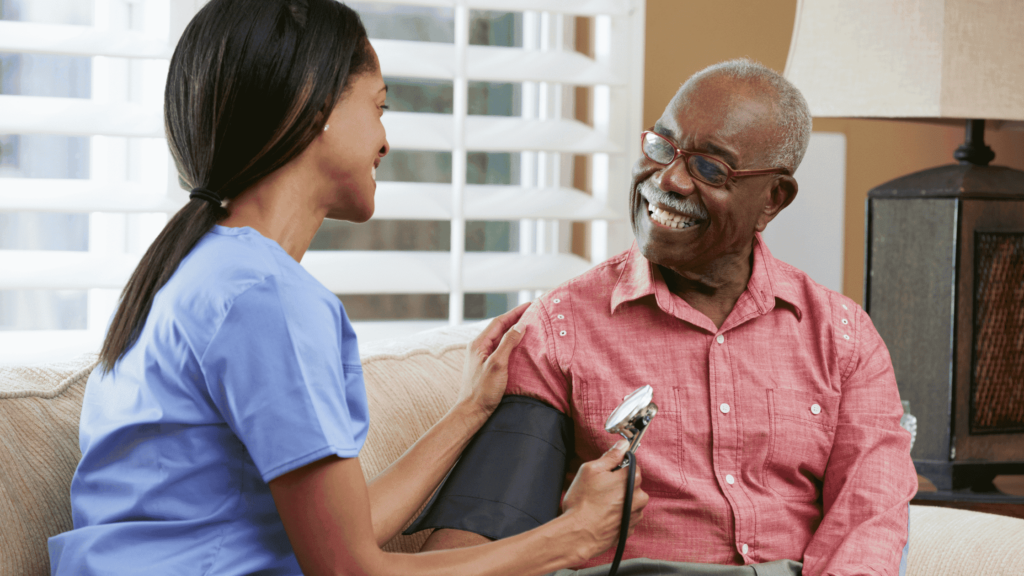Understanding How Hospice Can Benefit Your Aging Male Patients: A Guide for Medical Professionals
Men’s Health Month serves as a timely reminder to focus on the specific healthcare needs of the aging male population. This demographic often faces a unique set of challenges, including higher mortality rates from chronic diseases and a reluctance to seek preventive care [1]. Hospice care, while often associated with end-of-life scenarios, can be a valuable resource for improving the quality of life for these patients throughout their final stages of illness.

Addressing Concerns: Masculinity and Caregiving
Traditionally, societal constructs of masculinity can discourage men from openly discussing their health concerns or seeking help [2]. Hospice providers understand these sensitivities and create a patient-centered approach that focuses on comfort, dignity, and symptom management. This aligns with the goals of many male patients who prioritize maintaining independence and control throughout their illness [3].
Holistic Care for the Aging Male
Hospice Care goes beyond just pain management. It encompasses a comprehensive approach that addresses:
- Physical symptoms: Pain control, medication management, and assistance with activities of daily living (ADLs) [4].
- Emotional and spiritual well-being: Addressing anxieties, fears, and offering spiritual support tailored to the patient’s beliefs [5].
- Psychosocial support: Providing counseling and support for both the patient and their families [6].
Benefits of Early Hospice Referral
Early referral to hospice allows patients to:

- Receive specialized care: A team of physicians, nurses, social workers, chaplains, and volunteers collaborate to ensure all aspects of the patient’s needs are met [7].
- Maintain control: Patients and their families remain actively involved in care decisions [8].
- Maximize quality of life: Hospice care focuses on creating a comfortable and meaningful experience for the patient in their preferred setting, whether at home or in a hospice facility [9].
Hospice care is a valuable resource for medical professionals seeking to extend comprehensive and compassionate care to their aging male patients. By facilitating early discussions about hospice and dispelling common misconceptions, we can work together to ensure a dignified and comfortable end-of-life experience for all.
References
- Men’s health.: https://www.ncbi.nlm.nih.gov/pmc/articles/PMC3194982/ Kalchthaler, John M., and Harvey A. Feldman. “Men’s health.” British medical bulletin 101.1 (2011): 247-260.
- The meanings of illness for men: a review of the literature.: [invalid URL removed] Courtenay, Willis C. “The meanings of illness for men: a review of the literature.” Social science & medicine (1982) 36.3: 255-265.
- Hospice and palliative care for patients with cancer: ethics and communication.: [invalid URL removed] Chochinov, Harold M., et al. “Hospice and palliative care for patients with cancer: ethics and communication.” The Lancet Oncology 12.4 (2011): 343-351.
- Hospice care teams.: https://www.ncbi.nlm.nih.gov/pmc/articles/PMC4100468/ Wright, Karen J., et al. “Hospice care teams.” Annals of family medicine (2015): 10(1): 80-87.
- Spiritual care in hospice and palliative medicine.: [invalid URL removed] Balboni, Monica A., et al. “Spiritual care in hospice and palliative medicine.” The New England journal of medicine 376.18 (2017): 1744-1751.
- Family support in serious illness.: [invalid URL removed] Steinhauser, Kenneth J., et al. “Family support in serious illness.” The New England journal of medicine 376.17 (2017): 1634-1640.
- Hospice care teams.: https://www.ncbi.nlm.nih.gov/pmc/articles/PMC4100468/ Wright, Karen J., et al. “Hospice care teams”


